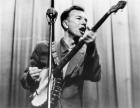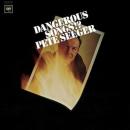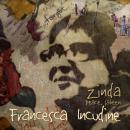جانے والے سپاہی سے پوچھو
وہ کہاں جارہا ہے
کون دُکھیا ہے جو گارہی ہے
بھوکے بچّوں کو بِہلارہی ہے
لاش جلنے کی بو آ رہی ہے
زِندگی ہے کہ چِلّا رہی ہے
جانے والے سپاہی سے پوچھو
وہ کہاں جارہا ہے
کتنے سہمے ہوے ہیں نظارے
کیسا ڈر ڈر کے چلتے ہیں تارے
کیا جوانی کا خوں ہورہا ہے
سرخ ہیں آنچلوں کے کِنارے
جانے والے سپاہی سے پوچھو
وہ کہاں جارہا ہے
گِر رہا ہے سِیاہی کا ڈیرا
ہو رہا ہے مِری جاں سویرا
او وطن چھوڑ کر جانے والے
کُھل گیا انقلابی پھریرا
جانے والے سپاہی سے پوچھو
وہ کہاں جارہا ہے
وہ کہاں جارہا ہے
کون دُکھیا ہے جو گارہی ہے
بھوکے بچّوں کو بِہلارہی ہے
لاش جلنے کی بو آ رہی ہے
زِندگی ہے کہ چِلّا رہی ہے
جانے والے سپاہی سے پوچھو
وہ کہاں جارہا ہے
کتنے سہمے ہوے ہیں نظارے
کیسا ڈر ڈر کے چلتے ہیں تارے
کیا جوانی کا خوں ہورہا ہے
سرخ ہیں آنچلوں کے کِنارے
جانے والے سپاہی سے پوچھو
وہ کہاں جارہا ہے
گِر رہا ہے سِیاہی کا ڈیرا
ہو رہا ہے مِری جاں سویرا
او وطن چھوڑ کر جانے والے
کُھل گیا انقلابی پھریرا
جانے والے سپاہی سے پوچھو
وہ کہاں جارہا ہے
Contributed by Bernart Bartleby - 2016/2/11 - 11:06
Language: Hindi
Traduzione in hindi (carattere latino)
SIPAHI
jaane waale sipahi se poochho
voh kahaaN jaa raha hai
kaun dukhiya hai jo gaa rahi hai
bhooke bachchoN ko behla rahi hai
laash jalne ki boo aa rahi hai
zindagi hai ki chilla rahi hai
jaane waale sipahi se poochho
voh kahaaN jaa raha hai
kitne sehme hue haiN nazaare
kaisa Dar Dar ke chalte haiN taare
kya jawaani ka KhooN ho raha hai
surKh haiN aaNchaloN ke kinare
jaane waale sipahi se poochho
voh kahaaN jaa raha hai
gir raha hai siyahi ka Dera
ho raha hai meri jaaN savera
o vatan choRh kar jaane waale
khul gaya inquilaabi farera
jaane waale sipahi se poochho
voh kahaaN jaa raha hai
jaane waale sipahi se poochho
voh kahaaN jaa raha hai
kaun dukhiya hai jo gaa rahi hai
bhooke bachchoN ko behla rahi hai
laash jalne ki boo aa rahi hai
zindagi hai ki chilla rahi hai
jaane waale sipahi se poochho
voh kahaaN jaa raha hai
kitne sehme hue haiN nazaare
kaisa Dar Dar ke chalte haiN taare
kya jawaani ka KhooN ho raha hai
surKh haiN aaNchaloN ke kinare
jaane waale sipahi se poochho
voh kahaaN jaa raha hai
gir raha hai siyahi ka Dera
ho raha hai meri jaaN savera
o vatan choRh kar jaane waale
khul gaya inquilaabi farera
jaane waale sipahi se poochho
voh kahaaN jaa raha hai
Contributed by Bernart Bartleby - 2016/2/11 - 11:07
Language: English
Traduzione inglese
SOLDIER
Ask the departing soldier
Where he is going
Who is the sad woman singing
Consoling hungry children
It smells of burning bodies
It is life that screams out
Ask the departing soldier
Where he is going
The vistas themselves are afraid
How frightened the stars proceed
Such murder of youth
Red are the hems of veils
Ask the departing soldier
Where he is going
The tent of darkness is falling
My dear, the dawn is coming
O you who have left the nation!
The revolutionary flag is unfurled
Ask the departing soldier
Where he is going
Ask the departing soldier
Where he is going
Who is the sad woman singing
Consoling hungry children
It smells of burning bodies
It is life that screams out
Ask the departing soldier
Where he is going
The vistas themselves are afraid
How frightened the stars proceed
Such murder of youth
Red are the hems of veils
Ask the departing soldier
Where he is going
The tent of darkness is falling
My dear, the dawn is coming
O you who have left the nation!
The revolutionary flag is unfurled
Ask the departing soldier
Where he is going
Contributed by Bernart Bartleby - 2016/2/11 - 11:08
Chiedo scusa, ma non so allineare correttamente il testo in Urdu (nemmeno il nome dell’autore) né postare quello in hindi in carattere Devanagari…
B.B. - 2016/2/11 - 11:08
L'allineamento va benissimo, però stavolta mi sono arreso col devanagari. Impossibile basarsi sulla trascrizione, che col miscuglio di minuscole e maiuscole sembra quasi klingon...
Riccardo Venturi - 2016/2/11 - 20:46
“Jaane wale sipahi se poochho” is a song of whose history Sumangala’s experience is now a part. When American folk singer Pete Seeger came to India, he accompanied Sumangala on the guitar at a gathering where she sang this song. “He could feel its emotion though he didn’t understand the language.” Also, after the 1984 anti-Sikh riots, during a peace march at DU in a tense atmosphere, Safdar Hashmi asked Sumangala to sing this song. “This song taught me how music can have tremendously cathartic effects,” Sumangala told her IIC audience. “It completely transformed the atmosphere.”
Songs of Freedom. Sumangala Damodaran on reviving songs of IPTA. (*)
(*) L’Indian People’s Theatre Association è stata un’organizzazione culturale indiana legata al Partito comunista, attiva in tutta l’India negli anni 40, successivamente limitata ad alcune aree in Bengala e Chhattisgarh
Songs of Freedom. Sumangala Damodaran on reviving songs of IPTA. (*)
(*) L’Indian People’s Theatre Association è stata un’organizzazione culturale indiana legata al Partito comunista, attiva in tutta l’India negli anni 40, successivamente limitata ad alcune aree in Bengala e Chhattisgarh
Bernart Bartleby - 2016/2/12 - 20:50
×
![]()
Note for non-Italian users: Sorry, though the interface of this website is translated into English, most commentaries and biographies are in Italian and/or in other languages like French, German, Spanish, Russian etc.






Versi di Makhdoom Mohiuddin (1908-1969), poeta Urdu, militante comunista e rivoluzionario originario dello Stato indiano dell’Hyderābād. Nella raccolta il cui titolo (in hindi) è “Surkh Savera” (“Alba Rossa”) del 1944.
Musica di Salil Chowdhury (1923-1995), compositore indiano, bengalese, autore delle colonne sonore di moltissimi film, dagli anni 50 e fino alla sua morte.
Testo in urdu, hindi e inglese trovato su questo sito gestito da Noaman Ali
Nella colonna sonora del film “Usne Kaha Tha”, diretto nel 1960 da Moni Bhattacharjee. Qui il testo della canzone è tradotto in hindi ed accreditato al liricista Shankardas Kesarilal, detto Shailendra (1921-1966), con il titolo “Jaane Waale Sipahi Se Poochho”. Viene omessa l’ultima strofa del testo originale.
Il poeta Makhdoom Mohiuddin scrisse questi versi in urdu all’inizio della seconda guerra mondiale. Da comunista rivoluzionario e anticolonialista, Mohiuddin non poteva non scrivere una poesia contro una guerra che nei paesi ancora sotto il giogo colonialista veniva diffusamente percepita come affare dei dominatori occidentali che tuttavia costringevano i popoli dominati ad andare a combattere in una guerra non loro. Il patto di non aggressione ancora in vigore tra Hitler e Stalin faceva poi sì che per i comunisti come Mohiuddin la guerra in Europa fosse per giunta imperialista, così come definita dalla Komintern. La posizione cambiò totalmente dopo l’avvio dell’operazione “Barbarossa” nel giugno del 1941, l’aggressione nazista all’Unione Sovietica: la guerra imperialista divenne “guerra di popolo” e Mohiuddin forse ebbe qualche difficoltà a giustificare questi suoi versi.